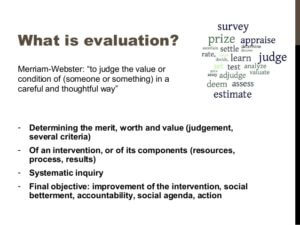
We’re nearing the end of the annual performance review season and I always question their value on the receiving end. Don’t get me wrong, I think they are valuable when they are done well, especially in an ongoing manner throughout the year. It’s called feedback throughout the year. I for one enjoy writing the reviews and spend a great deal of time preparing them throughout the year. These reviews have a perceived value because I make it a point that adds value for the recipients. The final written reviews are chocked full of good feedback and positive and constructive action items to work on. They provide some guidance for the upcoming year.
Everything discussed, formal or informal enhances performance.
(Damian Thomas)
For people in the beginning and middle portions of their career track, reviews can be quite valuable provided that the manager takes these reviews seriously. My best reviews in the early stages of my career were performed by leaders that provided guidance and feedback throughout the year. The “formal” review at the end of the year was a formality and nothing said and written was a surprise as the performance and behavior points were covered already, for that year.
Bottom Line #1.
Everyone has a need, desire, and a basic requirement to receive some kind of feedback.
The worst managers of jobs past rarely put any effort into the year-end review. The last few weeks of the year, they would take a snapshot that captures the good, bad, successes, or failures for the most part, and would become the cornerstone of that year’s review. The very worst ones would even use a prior year’s point of “corrective feedback” as part of the current year. I assume they probably weren’t prepared for review time with new observations of behaviors and performance. The ineffective managers also did all of the talking and covered only my behavior patterns that bothered them the most, and yet offered no suggestions for an adjustment. (Yep, I have a few behavior patterns that bother bad managers.) Ineffective managers harp on your weaknesses that annoy them and these weaknesses usually have nothing to do with performance.
Good managers/leaders, on the other hand, focus on building strengths. They just make sure that your weaknesses don’t flare up and cause an “untimely” behavior event at the wrong time.
Bottom Line #2
“As we advance in our careers, behavioral changes are often the only significant changes we can make.” (Marshall Goldsmith)
One of my memorable reviews came after a record-breaking sales year. I was waiting in the conference room and the manager walked in and slid the review across the 15-foot conference table. As it was sliding across the table they said, great year, here’s review, sign it, I’ll be back. He then left without even sitting down for a chat. After a great sales year, I didn’t need the validation of a formal review and I still do not, but gee whiz a five-minute conversation would have been nice. This was the type of manager who loved everything else about his job except the year-end review. I accept that and I made the process easier for them in the future by writing the review for them.
The best managers always ask questions to get you talking. As a manager, one question stuck with me over the years that I routinely ask. You can even flip it around and ask your manager about this during your conversations or formal review.
Bottom Line #3
Is there anything you need more of or less of—-from me?
If you have a solid relationship with that person and communicate regularly, you will catch that person flat-footed when you ask this question. Most times, they will not have an immediate answer. Remain silent and wait for a response. When the response comes, it will guide the rest of the conversation. More importantly, this question changes the dynamics of the conversation which usually sheds light on a blind spot. This question will also set up your upcoming action items or goals to work on, together. Posing this question will lead to year-end reviews that will spend more time on career tracks and planning for the future and growing into more responsibilities.
I have yet to pose this question to mrsfromthebachrow. I guess timing is everything and flowers in the kitchen should be refreshed before I ask this question when she’s not busy.
Action Item To Consider
Prepare yourself for the review by listing your accomplishments for the measured period. To simplify the process for next year, create a Word doc and keep a running journal of your accomplishments. One or two bullet points are all that it takes. Make sure you put a date on the note just in case you want to look for a supporting document. Don’t worry about filtering or evaluating the criteria for the accomplishment at this time.
Make an effort to assign metrics around the accomplishment as it will add more value. This extra effort may come in handy when you are updating your resume.
Be consistent, as this will roll up into a nice document at the end of the year.
Once you have these accomplishments listed, you can now go through them and ask if they added value to:
1. your company or department
2. your customers or end-users
3. your peers, colleagues, or internal customers
4. your manager
5. yourself
It’s a very simple method that you build on throughout the year. It sure is a lot better than trying to remember what you did for the company or manager in a chaotic scramble in a three-day window to prepare for your review. (Yep, you should prepare for your review).
Bottom Line #4
Like many things mentioned in many articles in this blog, it comes down to thinking, planning, and taking action.
Going with the flow may or may not take you where you don’t want to be.
Blog Comments are welcome.
Comments on the other social media channels are appreciated.
If you find any of my blog articles helpful, interesting, or entertaining, please pass them along to your network.


